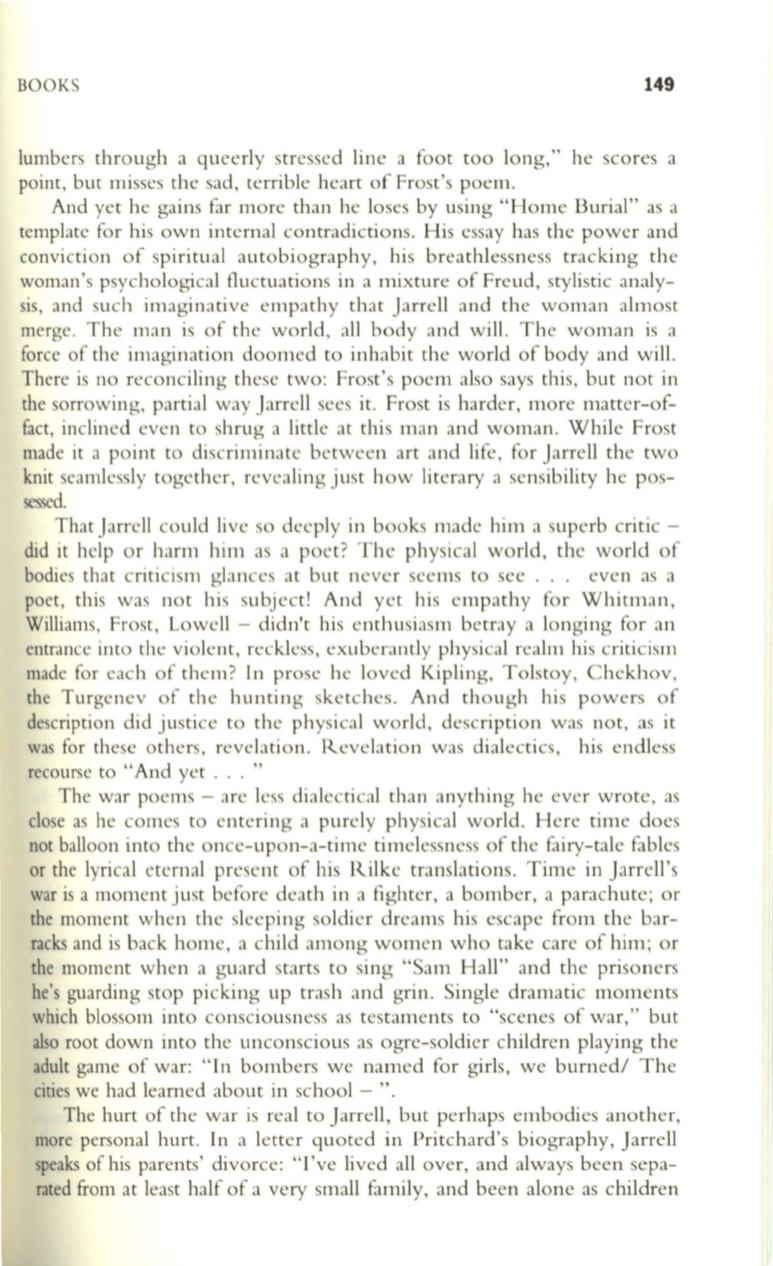
BOOKS
149
lumbers through a queerly stressed line a foot too long," he scores a
point, but misses the sad, terrible heart of Frost's poem.
And yet he gains t:1r more than he loses by using "Home Burial" as a
template for his own internal contradiction. His essay has the power and
conviction of spiritual autobiography, his breathlessness tracking the
woman's psychological fluctuations in a mixture of Freud, stylistic analy–
sis, and such imaginative empathy that Jarrell and the woman almost
merge . The man is of the world, all body and will. The woman is a
force of the imagination doomed to inhabit the world of body and will.
There is no reconciling these two: Frost's poem also says this, but not in
the sorrowing, partial way Jarrell sees it. Frost is harder, more matter-of–
fact, inclined even to shrug a little at this man and woman. While Frost
made it a point to discriminate between art and life, for Jarrell the two
knit seamlessly together, revealing just how literary a sensibility he pos–
sessed.
That Jarrell could live so deeply in books made him a superb critic -
did it help or harm him as a poet? The physical world, the world of
bodies that criticism glances at but never seems to see . .. even as a
poet, this was not his subject! And yet his empathy for Whitman,
Williams, Frost, Lowell - didn't his enthusiasm betray a longing for an
entrance into the violent, reckless, exuberantly physical realm his criticism
made for each of them? In prose he loved Kipling, Tolstoy, Chekhov,
the Turgenev of the hunting sketches. And though his powers of
description did justice to the physical world, description was not, as it
was for these others, revelation. Revelation was dialectics, his endless
recourse to "And yet ... "
The war poems - are less dialectical than anything he ever wrote, as
close as he comes
to
entering a purely physical world. Here time does
not balloon into the once-upon-a-time timelessness of the fairy-tale fables
or the lyrical eternal present of his Rilke translations. Time in Jarrell's
war is a moment just before death in a fighter, a bomber, a parachute; or
the moment when the sleeping soldier dreams his escape from the bar–
racks and is back home, a child among women who take care of him; or
the moment when a guard starts to sing "Sam Hall" and the prisoners
he's guarding stop picking up trash and grin. Single dramatic moments
which blossom into consciousness as testaments to "scenes of war," but
also root down into the unconscious as ogre-soldier children playing the
adult game of war: "In bombers we named for girls, we burned/ The
cities we had learned about in school - ".
The hurt of the war is real to Jarrell, but perhaps embodies another,
more personal hurt. In a letter quoted in Pritchard's biography, Jarrell
speaks of his parents' divorce: "I've lived all over, and always been sepa–
rated from at least half of a very small family, and been alone as children


